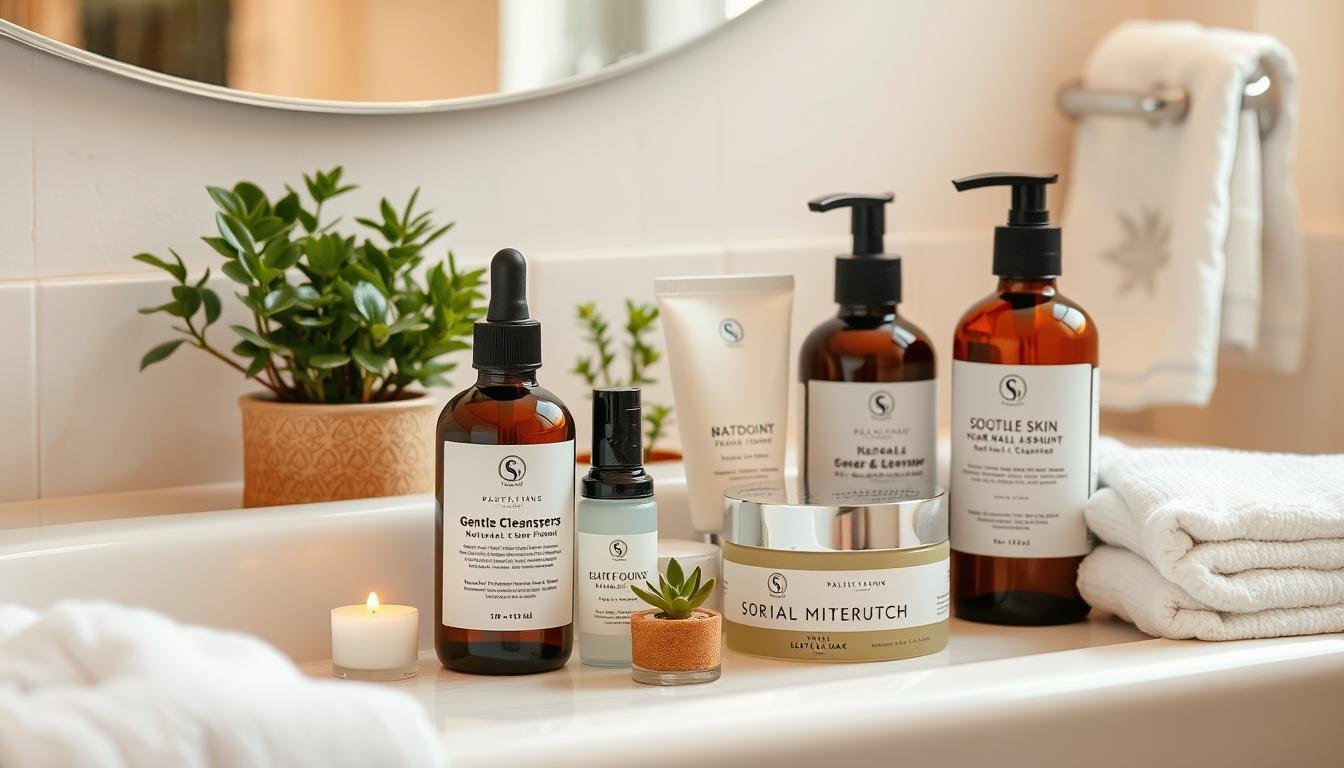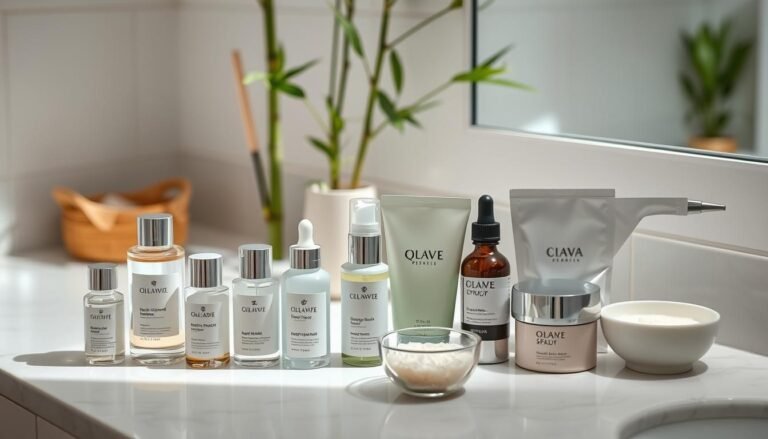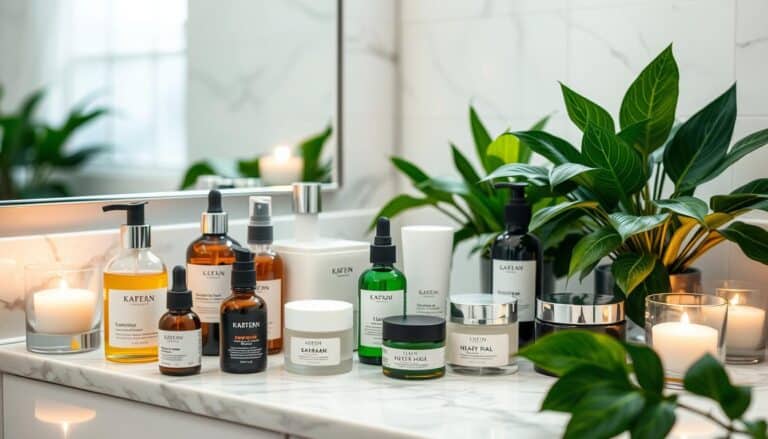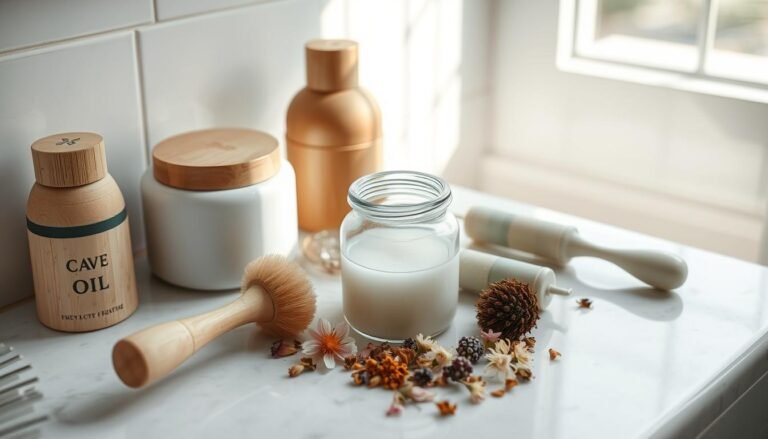10 Beauty Tips for Sensitive Skin
This post may contain affiliate links which means I may receive a commission for purchases made through links at no extra cost to you. I only recommend products I truly believe in. Thank you for your support!
Hey babe! Dealing with sensitive skin can be tough. With 48% of people using the wrong products, it’s time to learn about skincare.
Sensitive skin is a real issue for many. It often happens when makeup or skincare products cause allergic reactions. If you see redness, irritation, or unexpected breakouts, you’re not alone!
The good news is that gentle cleansers can change your skin’s health. Natural ingredients are great for products that won’t irritate your skin. Your skin needs care that keeps it calm and comfortable.
Many people don’t know that using too many products can harm sensitive skin. Only 22% of people keep their skincare clean, which can cause more irritation. By knowing what your skin needs, you can find a skincare routine that really works.
Ready to take care of your sensitive skin and make it glow? We’ll share tips to help you navigate skincare with confidence and ease!
Understand Your Skin Type and Its Needs

Discovering your unique skin type is like unlocking a secret map to awesome skincare! With up to 50% of people identifying as having sensitive skin, understanding your skin’s specific needs becomes crucial for effective skin irritation prevention.
Let’s dive into the world of skin sensitivity and learn how to keep your complexion happy and healthy!
Recognizing Signs of Sensitivity
Your skin speaks a language of its own, and learning to understand its signals is key. Here are classic indicators of sensitive skin:
- Persistent redness and blotchiness
- Frequent itching or burning sensations
- Quick reactivity to new products
- Visible irritation after environmental exposure
Common Triggers to Avoid
Dermatologist recommendations emphasize identifying and eliminating potential skin irritants. Check out these common triggers:
- Chemical Irritants: Harsh sulfates, synthetic dyes
- Environmental Factors: Pollution, extreme temperatures
- Product-Related Issues: Fragrances, alcohol-based products
- Lifestyle Factors: Stress, poor diet, lack of sleep
Pro tip: Always patch test new products and introduce them gradually to minimize potential skin reactions!
Choose Gentle Cleansing Methods
Skincare can be hard, especially with sensitive skin. Your routine needs gentle cleansers that keep your skin balanced.
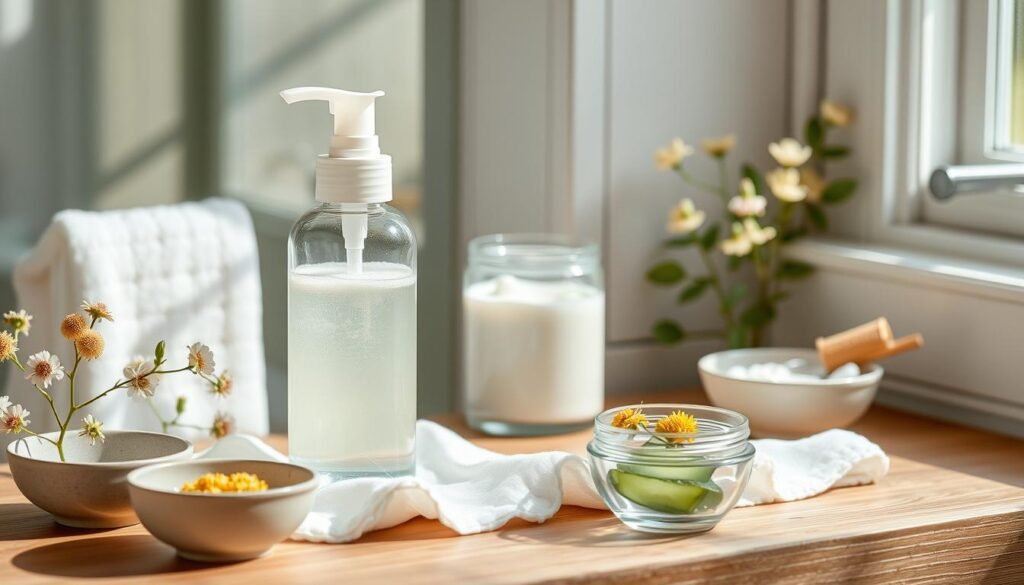
Finding the right way to clean your skin is crucial. Here are some tips to keep your skin healthy and calm.
Opt for Hydrating Cleansers
Choose cleansers that focus on keeping your skin hydrated. Look for products with:
- Moisturizing ingredients like ceramides
- A low pH level (less than 6)
- Fatty acids for hydration
- No harsh surfactants
Pro tip: Sulfate-free cleansers are great for sensitive skin!
Incorporate Double-Cleansing Techniques
Double-cleansing is a big help for sensitive skin. Here’s how to do it gently:
- Begin with an oil-based cleanser to remove makeup and sunscreen
- Then, use a gentle water-based cleanser
- Use lukewarm water to avoid irritation
- Gently pat dry instead of rubbing
Be gentle with your skin. Clean it once or twice a day. Micellar water is a quick, gentle option that won’t harm your skin’s barrier.
Moisturization: Key to Soothing Sensitive Skin
Caring for sensitive skin means being gentle and choosing the right hydration. Your skin’s barrier is delicate and needs special care to stay healthy and comfortable.
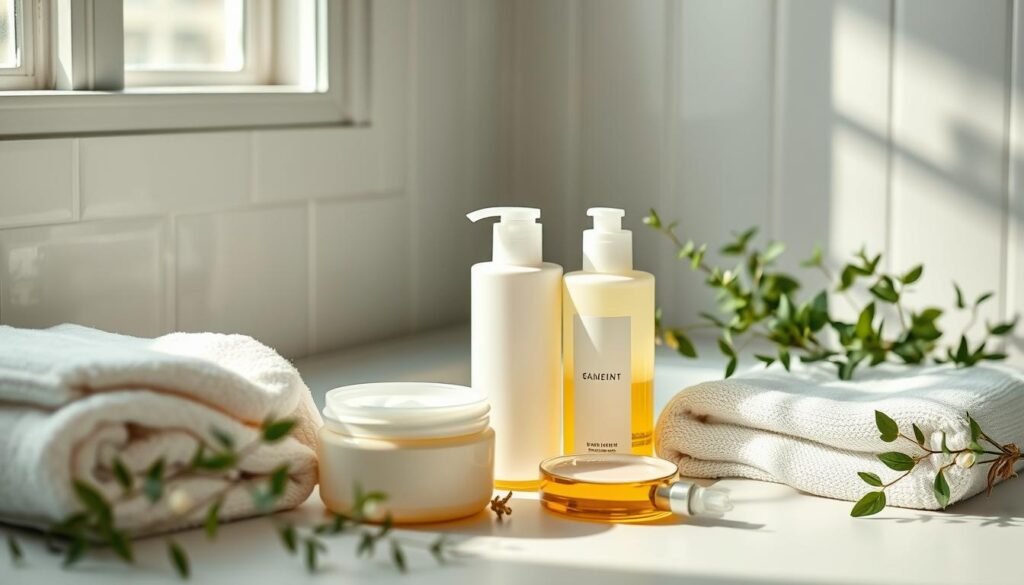
Sensitive skin often feels dry and irritated. The right moisturizer with natural ingredients can greatly improve your skincare routine.
Best Ingredients for Hydration
- Hyaluronic acid: Locks in moisture and plumps skin
- Aloe vera: Provides soothing relief and hydration
- Shea butter: Deeply nourishes sensitive skin
- Glycerin: Helps retain skin’s natural moisture
How to Properly Apply Moisturizers
Using hypoallergenic products right is as important as choosing the right ingredients. Gentle application helps avoid irritation and boosts hydration.
- Cleanse skin with lukewarm water
- Pat skin dry (never rub)
- Apply moisturizer using light, upward strokes
- Use a small amount – a little goes a long way!
| Skin Concern | Recommended Natural Ingredient |
|---|---|
| Redness | Turmeric extract |
| Dryness | Evening primrose oil |
| Irritation | Bladderwrack extract |
Pro tip: Always patch test new hypoallergenic products before full application to ensure your sensitive skin doesn’t react negatively!
Remember, staying hydrated internally by drinking plenty of water is just as crucial as external moisturization. Your skin will thank you for the extra love and care!
Sun Protection for Sensitive Skin
Protecting your sensitive skin from harmful UV rays is a game-changer in your skincare routine! Sensitive skin needs extra care when it comes to sun protection. I’m here to break down everything you need to know to keep your skin safe and glowing.
Did you know that 80% of skin aging comes from sun damage? That’s why sun protection isn’t just a summer thing. It’s an everyday essential, especially for those with sensitive skin!
Why Broad-Spectrum SPF Matters
Sensitive skin is more vulnerable to UV damage, making sun protection crucial. Here’s why broad-spectrum SPF is your skin’s best friend:
- Protects against both UVA and UVB rays
- Prevents premature aging
- Reduces risk of skin irritation
- Helps maintain skin barrier health
Choosing the Right SPF Products
When selecting sun protection for sensitive skin, look for these key features:
- Mineral-based sunscreens with zinc oxide or titanium dioxide
- Fragrance-free cosmetics that won’t irritate your skin
- Broad-spectrum protection with SPF 50+
- Lightweight, non-greasy formulas
Pro tip: The FDA recommends reapplying sunscreen every two hours, especially when you’re outdoors. For sensitive skin, opt for gentle, fragrance-free cosmetics that provide maximum protection without causing irritation.
Some top recommended sun protection products for sensitive skin include La Roche-Posay Anthelios Mineral Sunscreen and EltaMD UV Clear Broad-Spectrum SPF 46. Always apply sunscreen as the final step in your morning skincare routine, about 15-30 minutes before sun exposure.
Incorporate Minimal Makeup Practices
Dealing with makeup on sensitive skin can be tricky. Minimalism is key when following the 10 Beauty Tips for Sensitive Skin. Over 50% of adults face skin sensitivity, making the right makeup choice vital for healthy skin.
Opt for mineral-based and hypoallergenic brands like Bare Minerals and Clinique. They offer anti-inflammatory remedies that protect your skin gently. Always test new products for 24 hours first. Avoid artificial perfumes, dyes, and harsh chemicals that can irritate your skin.
Best Makeup Types for Sensitive Skin
Choose makeup with soothing ingredients like hyaluronic acid and natural minerals. Brands like Physicians Formula have lines for sensitive skin. Their products are lightweight and won’t clog pores or irritate. Remember, less makeup is better!
Tips for Successful Application
Clean tools are essential for sensitive skin. Use fresh brushes and soft, disposable sponges to avoid bacteria. Remove makeup well with gentle, oil-based cleansers. Prioritize skincare over heavy makeup for healthier skin.
